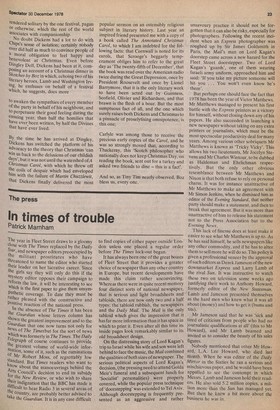The press
In times of trouble
Patrick Marnham
The year in Fleet Street draws to a gloomy Close with The Times replaced by the Daily Star, and newspaper editors preoccupied by the militant prostitutes who have threatened to name the editor who started their leader on her lucrative career. Since the girls say they will only do this if the mystery editor opposes their campaign to reform the law, it will be interesting to see which is the first paper to give them unsympathetic coverage. To date they must be rather pleased with the constructive and Positive reaction of the national press. In the absence of The Times it has been the Guardian whose letters column has Shown the greatest improvement and to the Guardian that one now turns not only for news of The Timesbut for the sort of news Which was formerly in The Times. The Daily Telegraph of course continues to provide the greatest volume of world-wide information, some of it, such as the ruminations of Mr Robert Moss, of regrettably low standard. But Times readers who want to know about the manoeuvrings behind the At Council's decision to end its subsidy for the New Review, or who wish to share their indignation that the BBC has made it difficult to hear Radio 3 in several areas of the country, are probably better advised to take the Guardian. It is in any case difficult to find copies of either paper outside London unless one placed a regular order before The Times lock-out began.
It has always been one of the great boasts of Fleet Street that it provides a greater choice of newspaper than any other country in Europe, but recent developments have made this claim rather unconvincing. Whereas there were in quite recent memory four distinct sorts of national newspaper, that is serious and light broadsheets and tabloids, there are now only two and a half types: the tabloid rubbish, the newspapers and the Daily Mail. The Mail is the only tabloid which gives the impression that it has far more information than it has space in which to print it. Even after all this time its inside pages look remarkably similar to its old broadsheet design. On the distressing story of Lord Kagan's trip to Israel while his wife and son were left behind to face the music, the Mail combined the qualities of both sizes of newspaper. The serious political aspects of Lord Kagan's decision, (the pressing need to attend Golda Meir's funeral and a subsequent lunch for 'Socialist' personalities) were properly covered, while the popular press technique of 'cloorstepping' was extended to Tel Aviv. Although doorstepping is frequently presented as an aggressive and rather unsavoury practice it should not be forgotten that it can also be risky, especially for photographers. Following the recent incident when an Express photographer was roughed up by Sir James Goldsmith in Paris, the Mail's man on Lord Kagan's doorstep came across a new hazard for the Fleet Street doorstepper. Two of Lord Kagan's 'guards', one of them wearing Israeli army uniform, approached him and said: 'If you take my picture someone will hit you . . . You won't even know he's there'.
But perhaps one should face the fact that 1978 has been the year of Victor Matthews. Mr Matthews managed to present his first battle with the Express printers as a victory for himself, without closing down any of his papers. He also succeeded in launching a new newspaper without taking on any extra printers or journalists, which must be the most spectacular productivity deal for many years. Among various other sobriquets Mr Matthews is known as 'Tricky Vicky'. This allows his two lieutenants, Mr Jocelyn Stevens and Mr Charles Wintour, to be dubbed as Haldeman and Ehrlichman respectively. But the only other obvious resemblance between Mr Matthews and Nixon is that both refuse to rely on personal charm. It was for instance unattractive of Mr Matthews to make an agreement with Mr Simon Jenkins, when he dismissed him as editor of the Evening Standard, that neither party should make a statement, and then to break that agreement. But it was more than unattractive of him to release his statement not to the Press Association but to the Evening News.
This lack of finesse does at least make it easier to see what Mr Matthews is up to. As he has said himself, he sells newspapers like any other commodity, and if he has to alter them to sell more he will do so. This policy is given a professional veneer by the approval of such editors as Derek Jameson of the new downmarket Express and Larry Lamb of the rival Sun. It was instructive to watch these two on television some weeks ago justifying their work to Anthony Howard, formerly editor of the New Statesman. Lamb and Jameson presented themselves as the hard men who knew what it was all about (money) and how to get it (bums and tits).
Mr Jameson said that he was 'sick and tired of criticism from people who had no journalistic qualifications at all' (this to Mr Howard), and Mr Lamb beamed and invited us to consider the beauty of his sales figures.
Nobody mentioned that other Mr Howard, L.A. Lee Howard, who died last month. When he was editor of the Daily Mirror in the Sixties he ran a serious and mischievous paper, and he would have been appalled to see the contempt in which Messrs. Lamb and Jameson hold their readers. He also sold 5.2 million copies, a million more than the Sun has managed yet. But then he knew a bit more about the business he was in.






















































 Previous page
Previous page